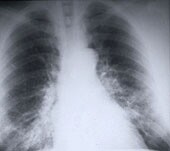
WEDNESDAY, Oct. 16 (HealthDay News) — Developers of a new lung cancer blood test say the screening method can discern with high accuracy whether a suspicious lung nodule is cancerous or benign.
Data from a new study “suggest we have achieved a 90 percent probability with this diagnostic classifier,” the study’s senior author, Paul Kearney, president and chief science officer of Integrated Diagnostics, said in a company news release.
Lung cancer remains the leading cancer killer of men and women. Every year, thousands of patients with lung nodules undergo diagnostic CT scans. When their doctors determine that a nodule has a higher probability of lung cancer, patients are often then required to undergo invasive biopsies or surgeries to look for cancer. These procedures, the researchers noted, are costly and often unnecessary.
The new blood test relies on a very sensitive technique, called multiple reaction monitoring mass spectroscopy, which measures the presence of different proteins in a person’s blood. These proteins may be associated with several cancer pathways, such as cell growth and proliferation.
Rather than look for a single sign (or “biomarker”) of cancer, the blood test looks for certain groupings of proteins, the company explained. When these arrays of proteins are detected, their concentrations are measured to determine if a lung nodule is benign or an early stage cancer.
The study, published Oct. 16 in the journal Science Translational Medicine, involved blood samples from 143 patients with either benign nodules or early stage lung cancer. The researchers examined the potential of 371 lung cancer biomarkers in millions of different combinations before determining the most effective grouping to use for the test.
Two lung cancer experts with no connection to the study were cautiously optimistic.
“CT scans detect early stage, curable lung cancers and save lives,” noted Dr. Jeffrey Schneider, director of the Lung Cancer Screening Program at Winthrop-University Hospital in Mineola, N.Y. “However, these same scans also frequently identify small lung abnormalities that are not cancer, thus producing false-positive results.”
Schneider said the new test “is reported to distinguish benign from malignant lesions seen on CT scans. If prospectively validated and appropriately priced, this test could enhance the safety and efficiency of CT scan screening for lung cancer.”
Dr. Len Horovitz, a pulmonary specialist at Lenox Hill Hospital in New York City, said that “patients often ask whether there is a blood test to diagnose cancer.”
The new test suggests “a way of identifying proteins in a blood sample that would indicate that a nodule found on chest X-ray is benign and therefore can spare that patient a diagnostic invasive procedure,” Horovitz said. “This is an exciting development that could hopefully be applied to other cancers as well in the future.”
More information
The American Academy of Family Physicians has more about lung nodules.
Copyright © 2026 HealthDay. All rights reserved.

